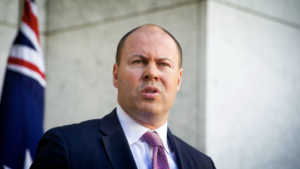Home » Commentary » Opinion » Make no mistake, this budget was a fiscally irresponsible failure
· Canberra Times

 If the test of a budget’s success is that it minimises the number of voters annoyed by its announcements, then the 2021-22 budget of the Morrison government is an outstanding success.
If the test of a budget’s success is that it minimises the number of voters annoyed by its announcements, then the 2021-22 budget of the Morrison government is an outstanding success.
However, by fiscal responsibility standards, the budget is a failure – quite possibly one of the worst in living memory.
Sometimes it is possible for a budget to be both responsible and pleasing to voters; but those circumstances are rare, and certainly do not exist at present.
The budget appears to have been designed to lift the government’s political stocks ahead of an election to be held before the next budget.
Election campaigns being what they are, we can expect even more spending promises from the government whenever the election is called.
Any hope that the opposition would offer a more responsible alternative was dashed by Albanese’s budget reply speech, which simply raised the ante with a new $10 billion social housing scheme.
The election promises to be a contest for votes, indirectly using money created by the Reserve Bank.
To be more specific, the budget is irresponsible for the following reasons.
First, it plays down the risks posed by the explosion of public debt and acquiesces in large deficits continuing for at least several more years. Sure, the peak projected level of debt has been marked down slightly since the last round of estimates.
But it could have been marked down more substantially had the budget provided for less spending and smaller deficits resulting from the increase in revenue from the stronger economy and iron ore boom.
Instead, the government has chosen to spend almost all the increase in revenue.
Second, it keeps stimulus going when it is no longer needed, with measures such as the extension of the low and middle-income tax offset.
The economy has recovered to a degree far beyond any expectations held last year.
It is no longer the delicate flower of a year ago. Instead of sticking to the script that all the fiscal support of 2020 would be temporary and phased out, Frydenberg has extended the stimulus.
When unemployment unexpectedly fell below 6 per cent, the government suddenly changed its fiscal strategy from one of budget repair once unemployment fell “comfortably below” 6 per cent to below 5 per cent.
Third, the budget is thoroughly in the mould of Keynesian demand management while continuing the neglect of supply-side or productivity-enhancing policies.
The government appears to be guided by a new theory that the road to stronger growth is to flood the economy with aggregate demand.
While this might work for a while, it will eventually confront the realities of exploding debt and rising inflation.
This is not to say that the budget is the primary vehicle for supply-side policies, but we know from government statements outside the budget context that there is no appetite for structural reform.
Fourth, the new spending in the budget is not just temporary stimulus spending but new permanent spending on social programs.
The budget papers reveal that new spending on aged care, child care, women’s economic security and safety, mental health and the previously announced increase in the JobSeeker rate will amount to almost $10 billion a year by 2024-25.
Increased spending on the National Disability Insurance Scheme – which is not classified as new spending because it is the cost of the scheme under existing policies – is about $5 billion a year.
Although the budget persists with the well-established practice of providing costings over four years as if everything comes to an end after four years, all this spending will be permanent beyond 2024-25.
To the extent this new spending has been encouraged by unexpected strength in revenue, it is repeating the mistake made by Gillard and Swan 10 years ago in using a temporary surge in revenue to finance new and permanent spending initiatives such as the NDIS and Gonski-inspired education funding.
Indeed, it is this budget’s expansion of permanent social spending, more than its embrace of Keynesian economics, that lends credence to the suggestion that it is more of a Labor budget than a Coalition budget.
The government is acting as if every perceived social problem can be solved by spending more public money.
It has proven politically incapable of countering well-organised and resourced campaigns for more public spending to fill in gaps in the social safety net, and simply caves in to them – whether it has the money or not.
Make no mistake, this budget was a fiscally irresponsible failure